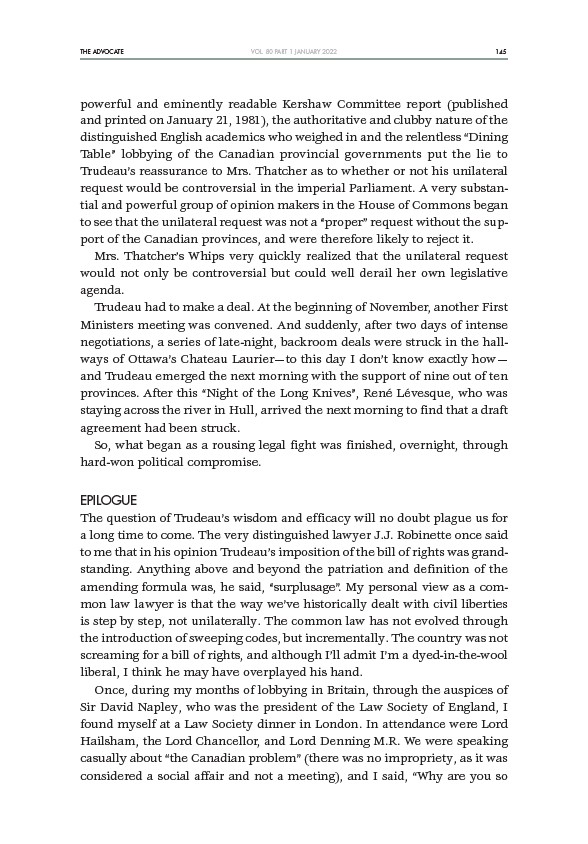
THE ADVOCATE 145
VOL. 80 PART 1 JANUARY 2022
powerful and eminently readable Kershaw Committee report (published
and printed on January 21, 1981), the authoritative and clubby nature of the
distinguished English academics who weighed in and the relentless “Dining
Table” lobbying of the Canadian provincial governments put the lie to
Trudeau’s reassurance to Mrs. Thatcher as to whether or not his unilateral
request would be controversial in the imperial Parliament. A very substantial
and powerful group of opinion makers in the House of Commons began
to see that the unilateral request was not a “proper” request without the support
of the Canadian provinces, and were therefore likely to reject it.
Mrs. Thatcher’s Whips very quickly realized that the unilateral request
would not only be controversial but could well derail her own legislative
agenda.
Trudeau had to make a deal. At the beginning of November, another First
Ministers meeting was convened. And suddenly, after two days of intense
negotiations, a series of late-night, backroom deals were struck in the hallways
of Ottawa’s Chateau Laurier—to this day I don’t know exactly how—
and Trudeau emerged the next morning with the support of nine out of ten
provinces. After this “Night of the Long Knives”, René Lévesque, who was
staying across the river in Hull, arrived the next morning to find that a draft
agreement had been struck.
So, what began as a rousing legal fight was finished, overnight, through
hard-won political compromise.
EPILOGUE
The question of Trudeau’s wisdom and efficacy will no doubt plague us for
a long time to come. The very distinguished lawyer J.J. Robinette once said
to me that in his opinion Trudeau’s imposition of the bill of rights was grandstanding.
Anything above and beyond the patriation and definition of the
amending formula was, he said, “surplusage”. My personal view as a common
law lawyer is that the way we’ve historically dealt with civil liberties
is step by step, not unilaterally. The common law has not evolved through
the introduction of sweeping codes, but incrementally. The country was not
screaming for a bill of rights, and although I’ll admit I’m a dyed-in-the-wool
liberal, I think he may have overplayed his hand.
Once, during my months of lobbying in Britain, through the auspices of
Sir David Napley, who was the president of the Law Society of England, I
found myself at a Law Society dinner in London. In attendance were Lord
Hailsham, the Lord Chancellor, and Lord Denning M.R. We were speaking
casually about “the Canadian problem” (there was no impropriety, as it was
considered a social affair and not a meeting), and I said, “Why are you so